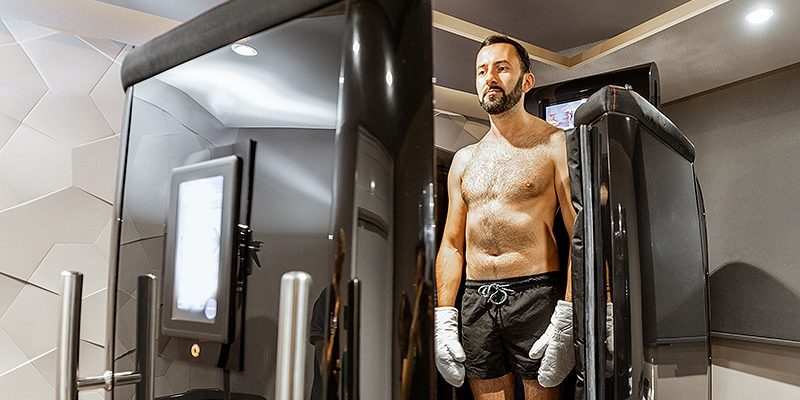The authors of a study suggesting that a deep freeze might help reverse one of the curious complications of COVID-19 have put their paper on ice after determining that they lacked adequate ethics approval for the research.
“Whole-Body Cryotherapy as an Innovative Treatment for COVID 19-Induced Anosmia-Hyposmia: A Feasibility Study,” was written by a group in France led by Fabien D. Legrand, of the University of Reims. The article appeared online this January in the Journal of Integrative and Complementary Medicine.
The randomized study looked at the effect of cryotherapy in 45 people whose sense of smell had been disrupted by COVID. Two-thirds received either high- or low-dose cryotherapy – which Legrand’s team defined as exposure to “extremely low temperatures (−60°C to −110°C) in a double Cryoair chamber (MECOTEC, Pforzheim, Germany) for 3 min” – while a third were assigned to a control group.
According to the investigators, whose affiliations included the French Society of Whole-Body Cryotherapy — and who nonetheless registered their protocol in the Iranian Registry of Clinical Trials:
In this pilot study, gains in olfactory function were clinically important in anosmic or hyposmic patients who received high-dose WBC (5 sessions over 1 week), with improvements ≥50% when comparing pre-intervention with follow-up assessments. We conclude that WBC might be beneficial and safe for patients with SARS-CoV-2-induced OD; however, further research is necessary to confirm the findings of this pilot study, and to investigate the mode of action.
The study got some attention – from the cryotherapy world, at least. As this article reported, with pictures, no less:
Bastien Bouchet, Founder of France-based cryotherapy center company Cryotera, has co-authored a recent study with Fabien Legrand, Lecturer in Psychology, University of Reims. He explained:
”
We came across this by complete chance. Two of our clients, who happened to have had Covid, were undertaking whole body cryotherapy sessions for pain relief and realized that after two sessions each, they had partially regained their sense of smell.” …
Of the 30 people who undertook the cryotherapy sessions, 28 saw a 200% improvement in their sense of smell score, while just two experienced no effect. To date, the participants who did regain some of their sense of smell have retained it at that level.
But as the retraction notice rather, um, frostily states, the researchers had missed a critical step in their work:
The article entitled, “Whole-Body Cryotherapy as an Innovative Treatment for COVID 19-Induced Anosmia-Hyposmia: A Feasibility Study,” by Legrand FD, Polidori G, Beaumont F, Bouchet B, Morin A, Derruau S, and Brenet E (Epub ahead of print Jan 13, 2022; DOI: 10.1089/jicm.2021.0254) is officially retracted at the request of the authors.
This request came after the paper had undergone full peer review, three rounds of revisions, acceptance, page proofs, and ultimately, online publication.
The
Methods
section of the published paper states that the study had “secured University ethics clearance…”1 but the authors explained that, “
after re-discussion and internal reassessment, it appears clearly that this study required, according to French law, the approval of a specific committee known as the ‘[C]ommittee for the [P]rotection of [P]ersons (CPP)’ and not a simple ethical agreement. For this reason, [we] request, in good faith, that the article be retracted. We apologize for this delay in taking a position, but this study gave rise to a re-discussion with our peers of the methodology which led us to realize our error ‘
a posteriori
.'”
.
The authors’ respective institutions have been notified by the publisher.
Journal of Integrative and Complementary Medicine
is committed to upholding the rigors of scientific publishing and the veracity of the literature.
Legrand didn’t respond to a request for comment.
Susan Jensen, the director of production and editorial operations for Mary Ann Leibert, which publishes JICM, told us that the second line of the retraction notice wasn’t really meant as a jab at the authors.
I included that line just to provide clear details because the article was online only for a very short time before the authors contacted me to request the retraction. Since several authors were listed, I wanted to ensure I received confirmation from all of them to retract the article. Admittedly, I was perplexed as to why the authors waited until the online publication of the paper to request the retraction since it took a fair amount of time from submission to online publication…
However, Jensen added that she’s still not satisfied with the authors’ explanation about the missing ethics approval:
I had requested more information about it, asking specifically how this missing approval was discovered long after submission, three rounds of revisions in peer review, the proofing stage, and then it’s subsequent online publication and the only explanation they provided to me was the direct quote that I included in the retraction notice, which I found troubling and for which I remain perplexed.
Source: Read Full Article
